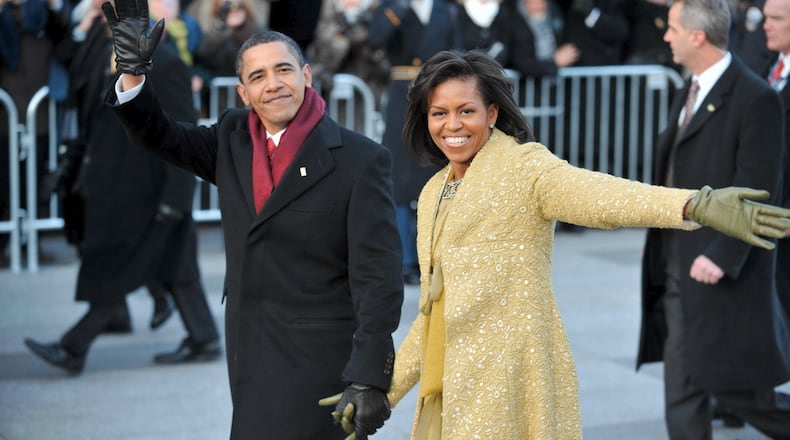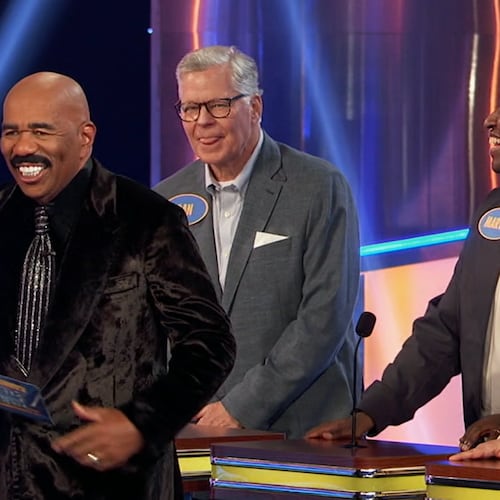Beside every modern American president has been a supportive spouse, dubbed the “first lady,” a phrase that first popped up in the vernacular in the 1800s, some 40 years after the death of Martha Washington.
Public perception of these women has shifted over time as the media began paying closer attention to their influence over their husbands. CNN, in a new series called “First Ladies” debuting Sunday at 10 p.m., profiles six of them covering the modern era, from Eleanor Roosevelt to Michelle Obama.
Obama is featured in the first episode, and Hillary Clinton — who has come closest of any woman to become the first U.S. female president— will conclude the series on Nov. 22. (The series will take a two-week hiatus Nov. 1 and 8 due to the presidential election, and given that this is CNN, episodes could get pushed back for breaking news.)
Liz Bronstein, an executive producer, said in an interview with The Atlanta Journal-Constitution Wednesday that Obama was a challenge for a historical series because she was in the White House so recently and much is already known of her time there. They created a one-hour version but felt they actually needed more time to flesh out her time at the White House, and CNN agreed to give her 90 minutes.
“She is so popular,” said Bronstein. who worked at CNN Center in Atlanta as a video journalist and editor right out of college from 1989 to 1994 and previously produced a 2017 CNN series “Believer with Reza Aslan.” “We felt the audience would embrace a 90-minute episode even though it wasn’t the plan in the beginning.”
The two Bush first ladies — Barbara and Laura — were omitted because CNN had just recently aired a detailed docuseries about the Bush dynasty called “The Bush Years: Family, Duty, Power.”
They also narrowed the series to the past 90 years because before Roosevelt, video archives were limited or nonexistent. Georgia’s own Rosalynn Carter, Jimmy’s wife, just missed the cut.
“It was a tough call, but we made our decision based on name recognition,” Bronstein said. “The six we picked had a little bit more.”
Here is Bronstein’s take on each of the first ladies up to Obama:
- Eleanor Roosevelt. This was her favorite episode. “She was a remarkable trailblazer and redefined the role of first lady. She held a press conference for women journalists, and no one had ever done that. These women journalists became devoted to her because she was paying attention to them." Roosevelt was an activist and big supporter of civil rights long before it was acceptable in the white power structure of her time.
- Jacqueline Kennedy Onassis. “I was least excited about her. I wondered what was really there in terms of her power. But there was a story about her going to France. She spoke fluent French and charmed the French president Charles de Gaulle. She gave her husband, John, a bigger voice there. He actually said, ‘I am the man who accompanied Jacqueline Kennedy to Paris.' Her grace and charm wielded power we often overlooked. She was more than a fashion icon."
- Lady Bird Johnson. “I didn’t realize that Lyndon Johnson experienced such serious depression. She had to manage that. And the Johnsons, because they were Southern, felt the Kennedys looked down on them. They had some insecurity about that when they took over.”
- Nancy Reagan. “She wielded power in so many different ways. It wasn’t just about the china or the dresses." Nancy influenced her husband’s decision-making including his collegial efforts to end the Cold War with Mikhail Gorbachev and his apology over the Iran-Contra arms-for-hostages scandal. (The episode also features a young journalist named Chris Wallace, who reported when White House chief of staff Donald Regan had the temerity to hang up on Nancy and soon lost his job.)
- Hillary Clinton. “This was the most challenging episode. We had so much material. We ended up focusing on her time as first lady rather than her time as Senator or her run for president.” The moment that really stood out to Bronstein was the time Clinton chose to attend a United Nations conference on women in 1995 against the wishes of staff at the White House. She famously spoke about how women’s rights are human rights. “You see a microcosm of her bravery,” Bronstein said.
The series was actually pitched by a London-based company October Films. They had built a studio with a replica Oval Office for a previous 2019 docuseries about Watergate and commandeered the set for this series to shoot some cinematic re-enactments to visually enhance the narrative.
Of the executive producers, Bronstein was the only American. She said she had to tweak the scripts — written largely by British people — to match American grammatical structures or terms. And for the Michelle Obama episode, she had them insert info about the time right-wing media heavily critiqued her for wearing a sleeveless dress. Huffington Post at the time facetiously dubbed it “Sleevegate.”
“None of them could believe this was a big deal,” Bronstein said. “They said, ‘What? How is this a thing?' But it was!"
ON TV
“First Ladies,” 10 p.m. Sundays on CNN starting Oct. 4 (and also available on HBO Max).
About the Author
Keep Reading
The Latest
Featured




